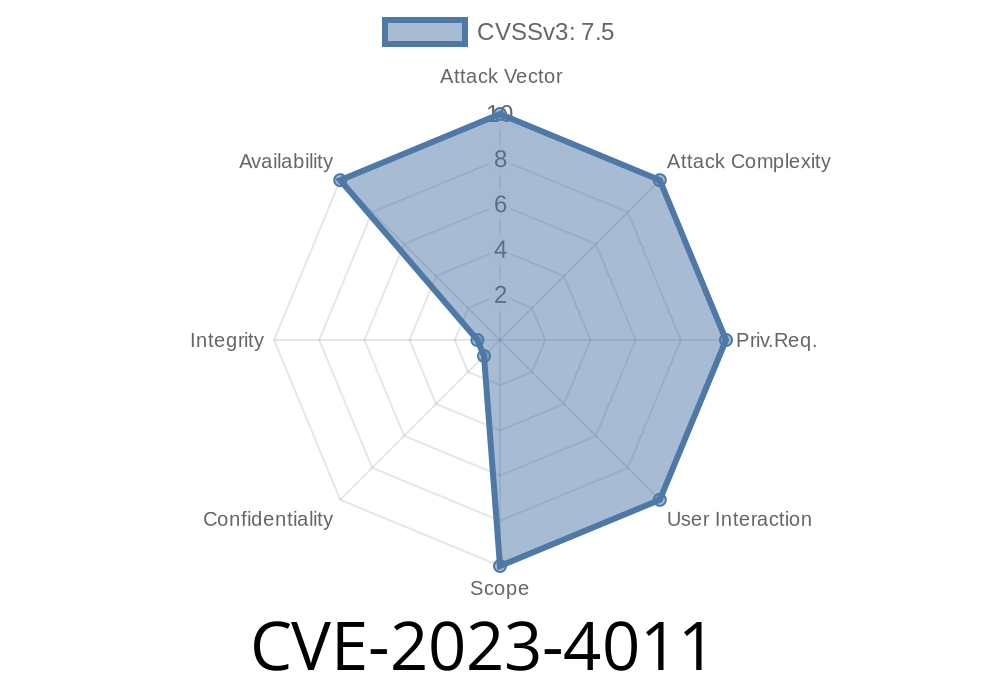In June 2023, a high-impact security vulnerability identified as CVE-2023-4011 was publicly disclosed, affecting GitLab’s Enterprise Edition (EE). This flaw lets an attacker drive up resource consumption on vulnerable GitLab EE servers, potentially making the service unavailable to genuine users – a classic Denial of Service (DoS) scenario. In this post, we’ll break down how this works, show simplified code snippets for context, and offer advice and references for protection.
The issue affects all GitLab EE versions from 15.11 up to, but not including, 16.2.2. Let’s dive into what happened, why it’s dangerous, and what you need to do.
What is CVE-2023-4011?
CVE-2023-4011 is a resource exhaustion vulnerability in GitLab EE. It means an attacker can make requests or trigger actions that cause the GitLab server to use excessive CPU and/or memory. If abused enough, these requests can overwhelm the server, making GitLab slow or completely inaccessible—a DoS attack.
How Did This Vulnerability Work?
GitLab is feature-rich, with projects, merge requests, issue tracking, and a powerful API. Sometimes, complex API endpoints or project features handle user-provided data inefficiently. By exploiting these inefficient parts, an attacker can send specific requests—often repeatedly or with specially-crafted data—that tie up server processing power.
While full technical details are not publicly available—for security reasons—here’s a simplified explanation:
Hypothetical Exploit Example
Let’s suppose GitLab has an endpoint vulnerable to being abused. (Note: This is for illustrative purposes only.)
# Example: Python-like pseudocode
def handle_project_report(project_id, report_params):
# Heavy report generation with no rate limits
report = generate_full_project_report(project_id, report_params)
return send_to_user(report)
# Attacker script hitting endpoint in a loop
import requests
GITLAB_URL = 'https://YOUR-GITLAB-INSTANCE/api/v4/project_reports';
YOUR_PROJECT_ID = '100' # or any large public project
for _ in range(100): # Run a large number of times
requests.post(f"{GITLAB_URL}/{YOUR_PROJECT_ID}/generate", json={"large_data": True})
In this (simplified) case, if the server tries to process overly complex or many costly reports without checks, an attacker could easily overload the backend by automating requests.
Patched: CVE-2023-4011 fixed in GitLab EE 16.2.2 (July 2023)
- GitLab Security Advisory: GitLab CVE-2023-4011 Advisory
- NVD Entry: NIST NVD CVE-2023-4011
Exploit Details
Although direct proof-of-concept (PoC) scripts are not public (to protect administrators), security researchers have confirmed that simple automation—just repeatedly making API calls—can trigger the flaw.
Mitigation & What To Do
1. Update GitLab
Upgrade immediately to 16.2.2 or above. This patches the flaw and protects your system.
2. Rate Limit and Monitor
Until you can patch, enforce API and user rate-limiting using reverse proxies (e.g., NGINX) or firewalls, and monitor for abnormal activity.
3. Restrict Unneeded Access
If possible, restrict public access to your GitLab API endpoints. Only allow trusted networks.
4. Review Logs
Check server and application logs for unusual spikes in requests or load.
5. Stay Informed
Follow GitLab’s security notices for emergency patches and fixes.
References
- GitLab Security Release 16.2.2
- NIST CVE-2023-4011 Details
- GitLab Upgrading Documentation
Conclusion
CVE-2023-4011 highlights an ongoing challenge: complex web applications like GitLab can sometimes overlook resource constraints, leading to big headaches if attackers find a way to exploit them. Because this issue is so easy to exploit and can affect availability, anyone running a vulnerable GitLab EE instance must patch as soon as possible.
Stay aware, stay updated, and help keep your services available for your real users!
Have you patched your GitLab instance yet? If not, act now — this one is easy to exploit and too risky to ignore.
Timeline
Published on: 08/02/2023 06:15:00 UTC
Last modified on: 08/04/2023 19:45:00 UTC
